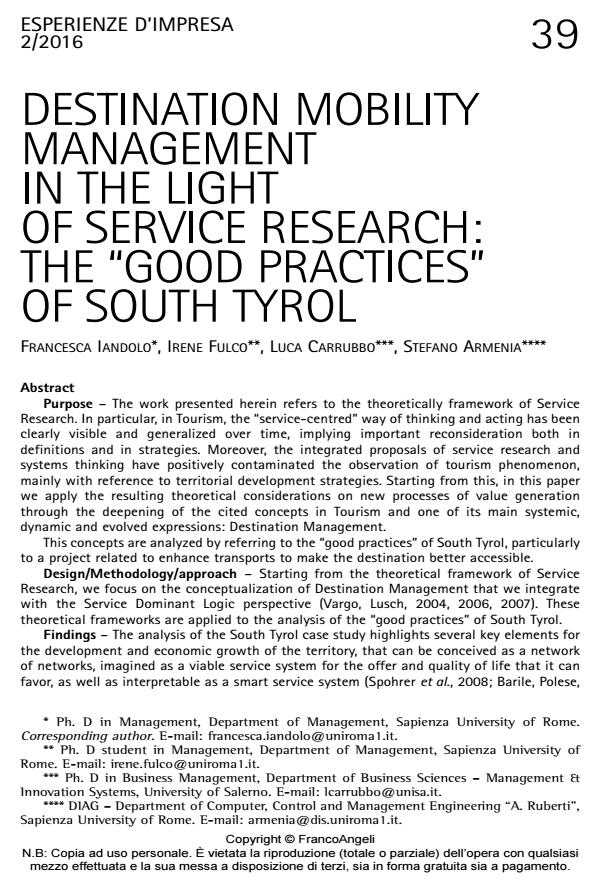Destination mobility management in the light of service research: the "good practices" of south Tyrol
Titolo Rivista ESPERIENZE D'IMPRESA
Autori/Curatori Francesca Iandolo, Irene Fulco, Luca Carrubbo, Stefano Armenia
Anno di pubblicazione 2018 Fascicolo 2016/2
Lingua Inglese Numero pagine 25 P. 39-63 Dimensione file 200 KB
DOI 10.3280/EI2016-002003
Il DOI è il codice a barre della proprietà intellettuale: per saperne di più
clicca qui
Qui sotto puoi vedere in anteprima la prima pagina di questo articolo.
Se questo articolo ti interessa, lo puoi acquistare (e scaricare in formato pdf) seguendo le facili indicazioni per acquistare il download credit. Acquista Download Credits per scaricare questo Articolo in formato PDF

FrancoAngeli è membro della Publishers International Linking Association, Inc (PILA), associazione indipendente e non profit per facilitare (attraverso i servizi tecnologici implementati da CrossRef.org) l’accesso degli studiosi ai contenuti digitali nelle pubblicazioni professionali e scientifiche.
Purpose - The work presented herein refers to the theoretically framework of Service Research. In particular, in Tourism, the "service-centred" way of thinking and acting has been clearly visible and generalized over time, implying important reconsideration both in definitions and in strategies. Moreover, the integrated proposals of service research and systems thinking have positively contaminated the observation of tourism phenomenon, mainly with reference to territorial development strategies. Starting from this, in this paper we apply the resulting theoretical considerations on new processes of value generation through the deepening of the cited concepts in Tourism and one of its main systemic, dynamic and evolved expressions: Destination Management. This concepts are analyzed by referring to the "good practices" of South Tyrol, particularly to a project related to enhance transports to make the destination better accessible. Design/Methodology/approach - Starting from the theoretical framework of Service Research, we focus on the conceptualization of Destination Management that we integrate with the Service Dominant Logic perspective (Vargo, Lusch, 2004, 2006, 2007). These theoretical frameworks are applied to the analysis of the "good practices" of South Tyrol. Findings - The analysis of the South Tyrol case study highlights several key elements for the development and economic growth of the territory, that can be conceived as a network of networks, imagined as a viable service system for the offer and quality of life that it can favor, as well as interpretable as a smart service system (Spohrer et al., 2008; Barile, Polese, 2010) that is able to remain adaptive and to respond appropriately to the changing needs of the context over time. Research limitations/implications - Although the study presented herein is essentially qualitative and descriptive, it could be a good starting point for further analysis that put in relation the role in fostering the service equipment of a specific destination with the touristic development of specific territorial areas. Originality/value - The analysis of interconnected territorial systems and the management of complexity resulting from their increasingly articulated organizations are well suited to a global analysis that enables a more effective assessment of the potential of a territory.
Parole chiave:Destination management, service systems, South Tyrol
Francesca Iandolo, Irene Fulco, Luca Carrubbo, Stefano Armenia, Destination mobility management in the light of service research: the "good practices" of south Tyrol in "ESPERIENZE D'IMPRESA" 2/2016, pp 39-63, DOI: 10.3280/EI2016-002003